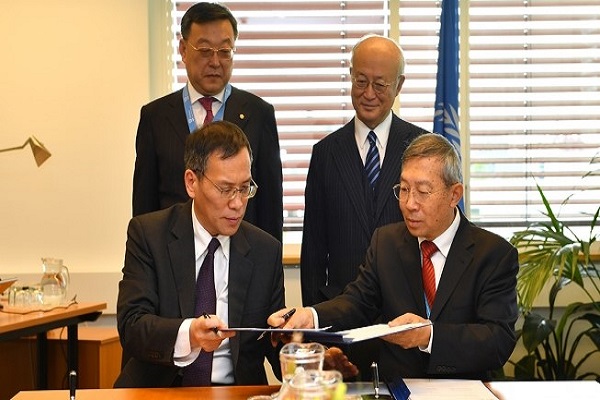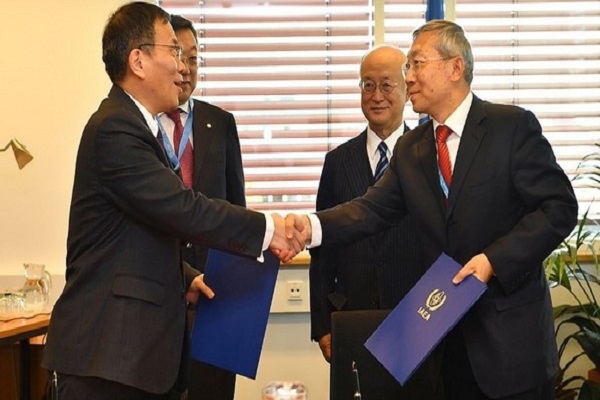
The agreement signed today will strengthen expertise in nuclear energy, nuclear safety and nuclear science and applications in the region. (Photo: D. Calma/IAEA)
The Chinese Atomic Energy Authority (CAEA) has pledged to train experts from across Asia in the various peaceful uses of nuclear technology, under an agreement signed today. The agreement, signed on the sidelines of the IAEA’s 61st General Conference, will strengthen expertise in nuclear energy, nuclear safety and nuclear science and applications.
“This practical arrangement represents abig step in training on the peaceful uses of nuclear technology in Asiaand the Pacific,” said Massoud Malek, programme management officer at the IAEA’s technical cooperation programme.
China has agreed to provide regional training coursesand long-term education programmes such as Masters Degrees and PhDs forstudents from developing countries — including least developed countries and small islands developing states (SIDS) — in the areas of nuclear energy,nuclear safety and security, and nuclear sciences and applications. Thetraining will be delivered under the IAEA technical cooperation programme.
The agreement is valid for four years.
Learning from China
With a large number of nuclear power reactors in operationand under construction, China has the fastest expanding nuclear powerreactor fleet in the world.
"We welcome students from emerging nuclear countries to actively participate,” said CAEA Chairman Tang Dengjie, referring to an Atomic Energy Scholarship the Chinese government has recently established.
The agreement signed today will also allow experts from around the region to use China’s facilities. This includes access to nuclear power reactors and research institutes.
In addition, China will dispatch experts to various Asian developing countries to provide technical assistance and support IAEA technical cooperation activities in the abovementioned fields.
The IAEA has been assisting China with its nuclear power programme since 1984, providing expertise in nuclear safety,nuclear power plant operation, uranium exploration, waste management andeducation. Since then, the IAEA has trained more than 3000 Chinese experts, supported more than 400 technical cooperation projects in the country and offered more than 700 fellowships.

Dazhu Yang (right), IAEA Deputy Director General and Head of the Department of Technical Cooperation, and Liu Yongde (left), Secretary General, China Atomic Energy Authority, sign Practical Arrangement. Vienna, Austria, 18 September 2017. (Photo: D. Calma/IAEA